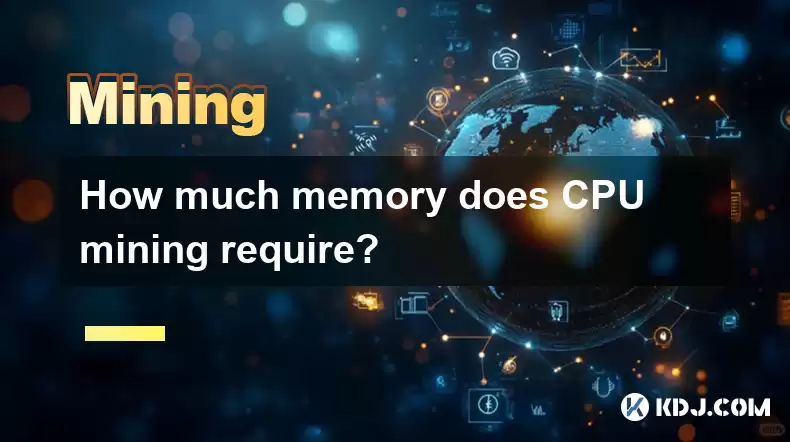-
 bitcoin
bitcoin $87959.907984 USD
1.34% -
 ethereum
ethereum $2920.497338 USD
3.04% -
 tether
tether $0.999775 USD
0.00% -
 xrp
xrp $2.237324 USD
8.12% -
 bnb
bnb $860.243768 USD
0.90% -
 solana
solana $138.089498 USD
5.43% -
 usd-coin
usd-coin $0.999807 USD
0.01% -
 tron
tron $0.272801 USD
-1.53% -
 dogecoin
dogecoin $0.150904 USD
2.96% -
 cardano
cardano $0.421635 USD
1.97% -
 hyperliquid
hyperliquid $32.152445 USD
2.23% -
 bitcoin-cash
bitcoin-cash $533.301069 USD
-1.94% -
 chainlink
chainlink $12.953417 USD
2.68% -
 unus-sed-leo
unus-sed-leo $9.535951 USD
0.73% -
 zcash
zcash $521.483386 USD
-2.87%
How much memory does CPU mining require?
CPU mining's memory needs are minimal, prioritizing processing power over RAM. Even older CPUs can mine, though performance varies greatly depending on the algorithm and software used. Upgrading your CPU, not RAM, is key for better results.
Mar 25, 2025 at 06:15 pm

- CPU mining's memory requirements are minimal compared to GPU mining. The exact amount depends on the algorithm and the cryptocurrency being mined.
- Most CPUs can handle the memory demands of CPU mining, even older models. However, performance varies significantly.
- Memory limitations are rarely the bottleneck in CPU mining; processing power is the primary limiting factor.
- Focusing on efficient algorithms and optimizing your CPU settings is more crucial than maximizing RAM.
- The memory usage is dynamic, fluctuating based on the complexity of the mining process.
The memory requirements for CPU mining are surprisingly low. Unlike GPU mining, which demands substantial VRAM, CPU mining primarily relies on processing power rather than large memory pools. The actual memory usage fluctuates dynamically depending on the specific cryptocurrency's mining algorithm and the software used. However, even older CPUs with limited RAM can often participate in CPU mining.
The amount of RAM used varies widely based on the chosen cryptocurrency and mining software. Some algorithms are less memory-intensive than others. For example, mining a cryptocurrency using a less demanding algorithm like Proof-of-Work (PoW) might only use a few hundred megabytes of RAM. In contrast, more complex algorithms might consume slightly more, potentially reaching a few gigabytes, but this is still significantly less than what GPU mining demands.
It's important to differentiate between system RAM (used by the operating system and other applications) and the RAM specifically used by the mining software. The mining software itself only requires a modest amount of RAM. The overall system RAM usage will be higher, as it includes the operating system's needs, other running programs, and the mining software's requirements. However, the mining software's RAM consumption is generally a small fraction of your total system RAM.
One crucial aspect to consider is the CPU's processing power. While memory requirements are low, a CPU's processing power is the primary limiting factor in CPU mining profitability. Even with ample RAM, a weak CPU will struggle to compete with more powerful processors in the mining process. Therefore, upgrading your CPU will likely yield far better results than simply increasing your RAM.
The mining software you choose also plays a role. Different software programs have different memory footprints. Some are optimized for efficiency, minimizing RAM usage. Others might be less efficient, potentially consuming slightly more memory. Researching and selecting efficient mining software is important, but the impact on RAM is usually negligible compared to the impact on CPU usage.
Overclocking your CPU can potentially increase its hash rate and improve mining performance, but it also increases the demand on both processing power and memory. While the memory increase is typically minor, it's something to keep in mind, especially if you're already operating close to your RAM capacity. Overclocking should be done cautiously and within safe limits to avoid damaging your hardware.
The choice of mining pool also indirectly influences memory usage. A pool's communication protocols and software can affect the overall resource consumption of your mining setup. However, the effect on memory is generally small. The impact on the overall performance of your CPU mining is more substantial.
The operating system also consumes RAM, which indirectly affects the amount of RAM available for mining. Running fewer background applications will free up more RAM for the mining process, although again, this is rarely a bottleneck in CPU mining. Optimizing your operating system can help improve overall system performance, but it's unlikely to dramatically alter the memory demands of the mining software.
Frequently Asked Questions:Q: Can I mine Bitcoin with a CPU?A: Technically yes, but it's incredibly inefficient and unprofitable due to the high computational requirements of Bitcoin's mining algorithm. The rewards are far outweighed by the electricity costs.
Q: What's the difference between CPU and GPU mining memory usage?A: GPU mining demands significantly more memory (VRAM) than CPU mining. GPUs are designed for parallel processing and handle large datasets, requiring substantial VRAM. CPUs use far less RAM for mining.
Q: Will adding more RAM improve my CPU mining performance?A: Likely not significantly. CPU mining is primarily limited by processing power, not memory. Adding more RAM might help if you're running many other applications simultaneously, but it won't drastically boost your mining hash rate.
Q: What if my CPU mining software crashes due to low memory?A: This is uncommon. If it happens, it's more likely due to a software bug or a conflict with other programs than a genuine lack of RAM. Try closing unnecessary background applications and restarting your mining software.
Q: Which algorithms are least memory-intensive for CPU mining?A: Research specific algorithms used by various cryptocurrencies. Some older, less computationally intensive algorithms may place less strain on system memory. Always check the specific requirements of the coin you intend to mine.
Disclaimer:info@kdj.com
The information provided is not trading advice. kdj.com does not assume any responsibility for any investments made based on the information provided in this article. Cryptocurrencies are highly volatile and it is highly recommended that you invest with caution after thorough research!
If you believe that the content used on this website infringes your copyright, please contact us immediately (info@kdj.com) and we will delete it promptly.
- Pepe Coin Takes a Tumultuous Turn: Decoding Volatility and Shifting Market Sentiment
- 2026-02-09 03:50:02
- XRP's Critical Juncture Meets ZKP Crypto's Auction Projection: AI Privacy Redefines Scarcity
- 2026-02-09 04:50:01
- Polly Cooper, Oneida Woman, Immortalized on New $1 Coin: Acknowledging a Pivotal Revolutionary War Figure
- 2026-02-09 05:00:01
- Super Bowl Coin Toss Betting Markets: A Look at the Odds and Trends
- 2026-02-09 04:45:01
- DraftKings Deals: Score $300 in Bonus Bets, No Promo Code Needed!
- 2026-02-09 04:40:02
- Stock Market Sees Sector Rotation as Nvidia Powers AI, Bitcoin Navigates Volatility
- 2026-02-09 04:35:02
Related knowledge

How to mine crypto sustainably in 2026?
Feb 07,2026 at 04:20pm
Energy Source Optimization1. Miners increasingly deploy solar arrays directly on warehouse rooftops to power ASIC rigs during daylight hours. 2. Geoth...

How to mine Conflux on a standard gaming laptop?
Feb 07,2026 at 04:19am
Hardware Requirements for Conflux Mining1. Conflux uses a proof-of-work consensus mechanism called Tree-Graph, which is designed to be ASIC-resistant ...

How to buy hashing power on cloud mining platforms?
Feb 08,2026 at 05:59pm
Understanding Cloud Mining Contracts1. Cloud mining platforms offer users the ability to rent hashing power without owning or maintaining physical har...

How to mine Flux with a 30-series Nvidia GPU?
Feb 07,2026 at 02:40pm
Market Volatility Patterns1. Bitcoin price movements often exhibit sharp intraday swings exceeding 5% during low-liquidity windows, particularly betwe...

How to pay taxes on crypto mining income in 2026?
Feb 07,2026 at 01:20am
Tax Classification of Mining Rewards1. Cryptocurrency received as mining rewards is treated as ordinary income by most major tax jurisdictions includi...

How to find the lowest fee mining pools for BTC?
Feb 07,2026 at 01:00pm
Fee Structure Transparency1. Most reputable BTC mining pools publish their fee schedules directly on their official websites, often under sections lab...

How to mine crypto sustainably in 2026?
Feb 07,2026 at 04:20pm
Energy Source Optimization1. Miners increasingly deploy solar arrays directly on warehouse rooftops to power ASIC rigs during daylight hours. 2. Geoth...

How to mine Conflux on a standard gaming laptop?
Feb 07,2026 at 04:19am
Hardware Requirements for Conflux Mining1. Conflux uses a proof-of-work consensus mechanism called Tree-Graph, which is designed to be ASIC-resistant ...

How to buy hashing power on cloud mining platforms?
Feb 08,2026 at 05:59pm
Understanding Cloud Mining Contracts1. Cloud mining platforms offer users the ability to rent hashing power without owning or maintaining physical har...

How to mine Flux with a 30-series Nvidia GPU?
Feb 07,2026 at 02:40pm
Market Volatility Patterns1. Bitcoin price movements often exhibit sharp intraday swings exceeding 5% during low-liquidity windows, particularly betwe...

How to pay taxes on crypto mining income in 2026?
Feb 07,2026 at 01:20am
Tax Classification of Mining Rewards1. Cryptocurrency received as mining rewards is treated as ordinary income by most major tax jurisdictions includi...

How to find the lowest fee mining pools for BTC?
Feb 07,2026 at 01:00pm
Fee Structure Transparency1. Most reputable BTC mining pools publish their fee schedules directly on their official websites, often under sections lab...
See all articles





















![Is This a REAL Reversal or Fake out?? I wouldn't Get Excited Just Yet... [20 Min emergency stream] Is This a REAL Reversal or Fake out?? I wouldn't Get Excited Just Yet... [20 Min emergency stream]](/uploads/2026/02/08/cryptocurrencies-news/videos/origin_698897450a654_image_500_375.webp)


![Mesocosmos (By Biskotos) [All Coins] | Geometry Dash Mesocosmos (By Biskotos) [All Coins] | Geometry Dash](/uploads/2026/02/08/cryptocurrencies-news/videos/origin_69889be2eac64_image_500_375.webp)

















































